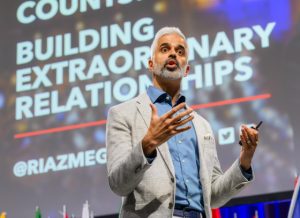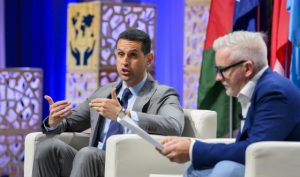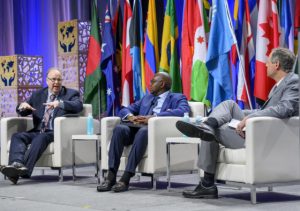WOCCU Examines lifting up the underserved through Digital Financial Inclusion
Open Banking discussion, human connection keynote also featured on final day of WCUC 2023
MADISON, WI (July 26, 2023) — World Council of Credit Unions (WOCCU) International Advocacy examined the unique role the credit union cooperative model can play in ensuring underserved and marginalized communities have access to financial inclusion in the digital revolution during a Wednesday breakout session at the 2023 World Credit Union Conference.
“We need to solve financial inclusion, and digitization is the way to do it. The model of credit unions is so critically important. We are happy to embrace the international standard setters, that (guidance) filters down to the national-level regulators. The proportionality that is included in that, that is where it helps you do what you do,” said Andrew Price, WOCCU Senior VP of International Advocacy and General Counsel.
Rodney Hood, a member of the U.S. National Credit Union Administration (NCUA) Board of Directors, joined Price, calling this “the civil rights issue of our time”. Hood said it is important to allow credit unions to experiment in the digital space.
“I want to give credit unions that we regulate, the flexibility to determine what works best for their members and for their expectations,” said Hood. “Pursue a level of experimentation with an eye toward safety and soundness of your institutions.”
Hood and Price both acknowledged that cybersecurity specifically continues to be a growing concern for both regulators and credit unions.
“That challenge will only be compounded in the years to come, as credit unions integrate digital solutions more fully into their business models. So, it is critically important that we all stay on top of this,” said Hood.
The future of Open Banking
Staying on the theme of digitization, Abraham Tachjian, Canada’s Department of Finance Open Banking Lead, joined Canadian Credit Union Association (CCUA) President and CEO and WOCCU Board Director Jeff Guthrie to provide a comprehensive overview on the subject from both a global and Canadian perspective.
In practical terms, Open Banking gives consumers the power to securely share their selected banking data with accredited third parties, such as online service providers or mobile apps, to notify them when bills are due, set up automated payments—even move money between accounts at different financial institutions.
Brazil, Australia and the UK are among the small number of countries that have developed a standardized infrastructure and regulatory framework for Open Banking. Tachjian admits Canada is behind schedule.
“I get it. It’s taken us a long time. Other jurisdictions have beaten us to the punch. But I would venture to say that not a single jurisdiction has gotten this right from the get-go,” said Tachjian. “But that gives us an opportunity to be a fast follower, this cliché term. Well, what does that mean? It allows us to look at other jurisdictions to see what’s worked, to import that here, but importantly also identify weaknesses in other systems and try to avoid that.”
Tachjian praised the UK and Australia for their rapid development of Open Banking, but said it was implemented due to poor market conduct by some financial institutions in those countries, leading to a punitive approach—something Canada wants to avoid. He noted that Brazil’s Central Bank also moved to implement Open Banking with impressive speed.
“But I’m also conscious of the toll that’s taken from a financial perspective and from a resource perspective within institutions to meet that aggressive timeline. So, that’s something we’re quite conscious of,” said Tachjian.
Every conversation counts
Attendees also learned how to have more meaningful connections with members in this digital age during the final keynote address of WCUC 2023.
Riaz Meghji, a human connection expert, shared how credit unions can “out care” their competition.
“If our goal is to build extraordinary credit union-member relationships, human connection isn’t an option—it is a necessity,” said Meghji.
In this digital age, credit unions have limited opportunities to do this. But Meghji said when a member goes to a physical branch location, it is likely because they are either in search of solutions to problems or they have a big financial decision to make, and that is exactly when having meaningful human interactions is most important.
“That is what will help cultivate connection. And those connections can then help more trust, more collaborations that will ultimately build the relationships that will push us forward. Because if we lead with connection, each and every one of you in this room can win with one important strategy—you will be able to ‘out care’ your competition,” said Meghji.
Still to come
The 2023 World Credit Union Conference, presented in collaboration with the Canadian Credit Union Association, concludes Wednesday night with a closing reception at the Vancouver Convention Centre.
Get ready for 2024
World Council of Credit Unions will host the 2024 World Credit Union Conference in collaboration with Credit Union National Association (CUNA/USA), July 21-24, 2024, in Boston, MA. To learn more, visit wcuc.org/boston.

Riaz Meghji

Abraham Tachjian (left) with Jeff Guthrie

(From left) Andrew Price and Rodney Hood in a Q&A session
About World Council of Credit Unions
World Council of Credit Unions is the global trade association and development platform for credit unions. World Council promotes the sustainable development of credit unions and other financial cooperatives around the world to empower people through access to high quality and affordable financial services. World Council advocates on behalf of the global credit union system before international organizations and works with national governments to improve legislation and regulation. Its technical assistance programs introduce new tools and technologies to strengthen credit unions' financial performance and increase their outreach.
World Council has implemented 300+ technical assistance programs in 90 countries. Worldwide, 82,758 credit unions in 97 countries serve 404 million people. Learn more about World Council's impact around the world at www.woccu.org.



